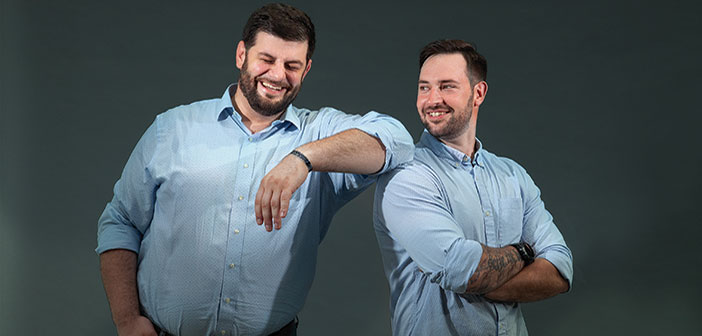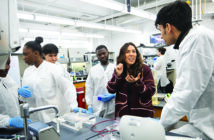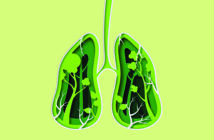In the military and in med school, these servicemember students find it’s the people beside you who make or break your experience.
Army veterans Tom Lopardo Jr. MD’20 and Scotti Pfirrman MD’20 met in the lobby of the Warren Alpert Medical School as first-year students. They quickly realized they had deployed on the same mission in 2009.
“I remember we were downstairs and Tom was like, ‘Are you kidding me?’” Pfirrman says.
Their battalions, one in the air and one on land, protected each other in Nangarhar, one hill apart in northeast Afghanistan.
“I flew a small scout helicopter for reconnaissance, looking for anything unusual,” Pfirrman says. “It is hard to distinguish what is an enemy soldier. Sometimes we would look for someone who was in a suspicious place or who had a weapon or something that just didn’t look right. You learn to see things … pattern recognition, I guess.”
“When we called in air support and we heard that chopper coming in, it was like, aah,” Lopardo recalls. “When the chopper comes over the hill, it just goes quiet. The enemy knows what that sound means, because they better stop and they better hide.”
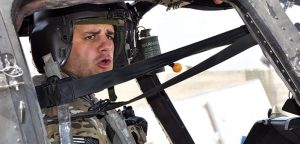
Scotti Pfirrman in the Kiowa Warrior helicopter he piloted. Photo courtesy Pfirrman.
Pfirrman and Lopardo deployed twice, for 12 months each time, to the War in Afghanistan, the second-longest war in US history after the Vietnam War.
The two men traveled different paths to the military and to medicine. Pfirrman graduated from West Point. Lopardo enlisted right after graduating from Oliver Wolcott Vocational Technical High School in Torrington, CT. During his second tour, he had an epiphany.
“By the end I had experience in wrapping up blast amputations, packing gunshot wounds, and I got to suture. Very advanced-level stuff,” Lopardo, 31, says. “I saw a lot, had a lot of trauma. It was one particular day, I said all right, I want to do this. … I called home and told my mom, ‘Hey, don’t laugh at me, but when I come home I want to go to medical school.’”
After nine years in the military, Lopardo went to college and became a paramedic. Now a third-year medical student, he plans to be a critical care specialist.
“I love ICU medicine and I like surgery. I feel calmer under pressure. I can think clearly, and I tend to like to jump to the lead, especially if nobody else is stepping up. I feel comfortable making decisions,” he says.
Pfirrman thought about medicine while at West Point, but 9/11 happened during his freshman year and he wanted to deploy first. At age 35, this humble, broad-shouldered “natural-born leader,” as his fellow vets call him, is thinking about a career in neurology.
“If I had told myself five years ago when I was in the military this is where I would be, I would have said no way. I didn’t picture myself in that elite group of people,” Pfirrman says, laughing. “I guess I just picture myself as more of one of the guys and a pilot, and just take care of my people at the end of the day. I guess that translates into medicine, just take care of your people.”
Like all vets, they know loss, tragedy, and triumph. Pfirrman lost one friend to suicide and watched another, a Green Beret, rebuild his life after stepping on a land mine.
“Overall, it motivates me to continue down the path. Sometimes, when things aren’t so great after a long week of studying, you kind of get stuck in your hole,”
Pfirrman says. “You have to just keep plugging forward, acknowledge your own mistakes, and try to make it
better for the next time. You just have to realize that life can be short.”
Not Your Typical Medical Student
Last year, 354 prospective medical students selected “Veteran” for military status on their American Medical College Application Service (AMCAS) form. Military service is highly regarded at Brown, says JoAnne McEvoy, MA, director of admissions at the Warren Alpert Medical School.
“The committee welcomes veterans to apply and values their contributions to the class and to medicine,” she says, adding that what stands out in applications from veterans is maturity, self-discipline, and a demonstrated commitment to service. Veterans often bring practical leadership experience within a large bureaucracy, a skill set that transfers well to the complex field of medicine.
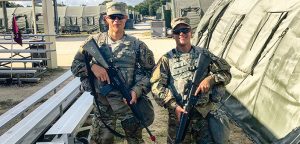
Tim Wright, on the right, in Afghanistan. Photo courtesy Wright.
“While life experience as a veteran would be a valuable perspective in many areas, when working directly with other veterans it can offer empathetic understanding for a group of patients who often feel their experiences are not really understood,” McEvoy adds.
These are not your typical med students. They had to squeeze in pre-med science courses at night and perform well in postbaccalaureate programs during or after their military careers. Some started college several years after high school. Some saw direct combat. A few deployed on multiple tours to dangerous areas. They were pushed physically and tested emotionally by extreme temperatures, scorpions, desert sandstorms, and heavy artillery.
All have worked in unpredictable environments with a variety of people, responsibilities, and unimaginable stress.
The training and cultures of medicine and the military are distinct, yet the experiences, at times, may be similar. Soldiers witness sadness and sorrow trying to serve and trying to help; so do doctors. Both have ways of dealing with stress, suffering, chaos, and death. Military training may be the most formative experience of a soldier’s life, just as medical training may be for a doctor.
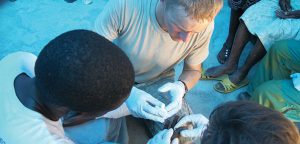
Mike Zaskey treats an infected wound in Haiti, in 2010. Photo courtesy Zaskey.
Mike Zaskey ’17 MD’21, a former Army sergeant and medic, enlisted at age 17 from his hometown of West Springfield, MA.
After six years in the military, Zaskey came to Brown and earned a degree in neuroscience. He operated a forklift at a Pepsi warehouse while waiting to start med school. Now 30, he says he likes physical work and has always had a sense of responsibility.
“After 9/11, I felt my country was at war, and I have an obligation to do something,” he says. “My father was an infantryman in Vietnam. He died between my sophomore and junior years of high school from ALS brought on by Agent Orange. That was traumatic. That is actually what spun me on the path to medicine.”
A member of the elite 82nd Airborne Division, Zaskey was assigned to the Global Response Force, a rapid response unit created to react to unforeseen events around the world. He was deployed to Iraq and Afghanistan, and in 2010 landed in Haiti 24 hours after the earthquake to provide medical care, food, and other supplies. He’s made 32 parachute jumps.
Zaskey shares an unspoken bond with the other veterans in this compatible group of med students. His closest friend is Alec Kinczewski MD’21.
Kinczewski, 34, served as a commissioned officer in the Army from 2006 to 2014 in Iraq, South Korea, Kuwait, Germany, and Japan. He started thinking about a career in medicine while overseas.
“There were some pretty seminal moments in Iraq where we had people come back who’d been horribly disfigured in the war,” Kinczewski says. “It planted the seed in my seeing the incredible difference physicians made and I always had an incredible respect for the field of medicine.”
Kinczewski was an information technology specialist in the military. Since coming home, he has worked to help homeless vets with Thomas O’Toole, MD, professor of medicine, at the Providence VA Medical Center.
“With us, I think we have had to deal with some extreme stresses,” Kinczewski says. “But we have found some ways to cope with that and still be successful. I think it is about finding ways to work a job with very long hours and very serious demands and finding the balance with that.”
Pfirrman agrees. “Having a good support network is incredibly important. Whether that is family or old friends from the service or new friends from med school, just having a good support network is good,” he says.
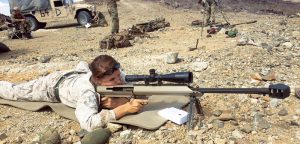
Lauren Luther demonstrates her marksmanship. Photo courtesy Luther.
Lauren Luther MD’22 is a Marine Corps veteran and Harvard graduate. Though she’d never fired a gun before joining the Marines, she became a certified marksmanship coach and a platoon commander in Afghanistan. With an interest in reconstructive plastic surgery, she wants to help injured soldiers. Her advice to anyone considering military service may apply to those going into medicine as well.
“Have a clear and strong reason why you want to serve,” Luther, 30, says. “You will face mental, physical, and emotional exhaustion, maybe all at once, maybe for a very long time. In those moments, your dedication to the cause has to be solid enough to power you through.”
Course Adjustment
These former military leaders now find themselves at the bottom of the medical chain of command, with a new mission to excel in their studies and become doctors.
“The academics have been a little more rigorous than I had planned,” Pfirrman says. “I had been through flight school and I had studied engineering, so I thought I would be up to snuff. But things move much quicker and with much more volume in medical school.”
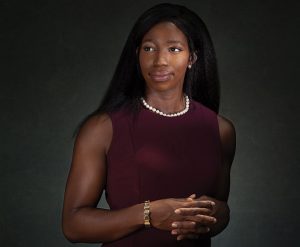
SERVICE ORIENTED: Uzoamaka Okoro is one of three military women at the Warren Alpert Medical School. “My whole life has been making commitments,” she says. Photo by Dana Smith.
Whether it’s taking a basic science exam or taking care of patients, these students often rely on their military
training. “As a pilot, you learn technical aspects of an aircraft and some rules of what you have to do when you fly, and how to adjust all that to meet the situational demands of what is going on,” Pfirrman says. “I think that mindset will help me.”
Max Kitaj MD’21, a former Army medic in Afghanistan, remembers the steep learning curve of his first year of med school. It was, he says, “exciting, at times frustrating, and just a huge learning experience across the board, from the subject matter to my own interpersonal dealings with people, especially people a lot younger than me. It has not been easy. I have grown a lot this year.”
He appreciates the environment at Brown. “I think this is a really great place,” he says. “You feel really held and supported here. There are mentors, advisers, therapists, learning specialists. I use them all and they are great. From other people I know at other med schools, that’s the exception to the rule. It is very supportive here.”
Kinczewski adds, “You have to take care of yourself and you have to find help. The very first day here, I went to talk to the behavioral health counselor. For me, it is more of a well visit than anything else. But it is good to have those there.”
Kitaj, 33, enlisted after getting a BA in biology at the University of California, Santa Barbara. He wants to be a psychiatrist. Interested in spirituality and medicine, Kitaj goes on Zen meditation retreats and has completed training courses in spiritual care.
“It was an intense four years, and some intense moments in Afghanistan. There is still a lot of processing going on,” he says. “Everything I am blessed with right now—a pregnant wife, being at Brown medical school, living in Providence—it’s unbelievable. Loving friends and family. Enough resources to do all this. Not for a second would I wish that I hadn’t done [the Army]. And yet it is still a tender experience, definitely.”
Patrick McGlone MD’21 was a Marine from 2012 to 2017 and a member of a Scout Sniper Platoon, but he never got the chance to deploy. He describes himself as a “stereotypical Marine,” a competitive power lifter, and ultra marathoner. He has run 50 miles in 13 hours.
His unit deployed after he entered medical school. “I am a little jealous,” he says. “It is awesome for those guys. I wish I could be there with them. Kind of disappointed that I missed it. But I am also really happy with what I’m doing here and don’t really regret that choice at all.”
A Complicated Past
Half a century ago Brown University discontinued ROTC (Reserve Officer Training Corps) on campus amid protests over the Vietnam War.
“Brown’s history with the military is very complicated,” Evan Stern ’16 MD’20 says. “I was surprised that there were as many veterans as there are at Brown.”
Service men and women from every branch have now returned to the campus. In 2012, the University established the Office of Student Veterans and Commissioning Programs to assist them.
Senior Associate Dean for Medical Education Allan R. Tunkel, MD, PhD, is impressed by the students who have military backgrounds. “I think the veterans contribute to the diversity of the students we are seeing at the school and bring a wealth of experiences that are important for our other students to hear about,” he says.
Not everyone knows these students were in the military. And they don’t always proactively talk about it. Receptions from other students have ranged from awkward to accepting.
“Around here at Brown and in medical school in general, like nobody in their entire life has been in the military,” McGlone, 24, says. “They have never known anyone in the military, their family doesn’t know anyone in the military. All they know is what they see on TV. I personally have had a great experience here in terms of people being curious.”
“During first year, apparently people were scared of me; I intimidated a lot of people,” Tom Lopardo says. “I had a beard. I have full tattoos. … People just saw that and people were kind of hesitant with my appearance, I guess.
“But my core group of friends—they seem to think I am a big teddy bear,” he says.
Scotti Pfirrman is more than willing to talk to anyone who’s interested. “We all have our own experiences and stories, and if you are interested, just ask,” he says.
Stern says he doesn’t think there’s tension between the military and civilians, but there’s “a lack of knowledge here at Brown. The fact that a lot of people around us, they just don’t know about the military. They are curious and willing to learn, but they just don’t know.”
He graduated from Brown and is now an HPSP medical student (see sidebar). He is also an EMT and volunteer fireman—and chose medicine over a shot at a baseball career. He says sometimes being in the military at Brown can feel like being the “other.”
“I think it is just like anything else: if you have never encountered someone who is X or Y, that is the ‘other,’” Stern says. “But when you start realizing that whatever label is being used pejoratively, [it]has a person behind it, and that person is not so different than you—that is where tolerance and understanding truly comes from, that personal interaction.”
Lopardo agrees. “Just like everyone else who has life experience, everyone has something to bring to the table,” he says. “There are things you can learn from people. Everyone can learn something from everyone else.”
Including learning not to stereotype. “Don’t lump us into a category. Just because I am tattooed and have a beard and was an infantry guy doesn’t mean I support Trump and that everyone should be deported and all that crap,” Lopardo says. “Honestly, people are a lot of times just scared to ask questions. Don’t be afraid to ask questions. If you ask a question I don’t want to answer, I am going to tell you that. It is as simple as that.”
They may disagree on US foreign policy, but as soldiers they defend the Constitution and the country. Their reasons for becoming doctors, their personal and political views, their socioeconomic backgrounds, races, and genders vary. They represent a wide range of backgrounds and beliefs.
Anthony Yao MD’21, an Air Force HPSP student, describes himself as “a college-educated Chinese guy from a privileged upper-middle-class background.” He says the military is a true place of diversity.
“I could tell you that it is stressed in the military that your race, ethnicity, creed, sex, etcetera does not matter—what matters is if you can get the job done, and in my opinion that is as objective and fair as any criteria can be,” he wrote in an email.
Uzoamaka Okoro ’16 MD’20 is one of three military women at the Medical School. (Timera Brown MD’22, a graduate of Tougaloo College, joined the first-year class along with Lauren Luther.)
“Being a woman of color in these two historically exclusive spaces, I am conscious of my intertwined identities and how they may impact how others see me and how I may choose to approach a situation,” Okoro says. “When I’m in the military setting, I notice that I am extremely aware of my gender. When I’m in on the medical side of things, I feel more aware of my race.”
“Actively making the choice to join the military inherently involves relinquishing a piece of your individuality for the well-being and strength of the Army,” she says. “However, I have not felt that I have had to compromise my identity in order to serve.”
Friends For Life
The camaraderie among this group is palpable. They tease each other one minute and offer support and comfort the next. They are like supportive siblings with a bond of brother- and sisterhood—especially if one is having a tough time on Memorial Day or other anniversaries.
Just as they did in Afghanistan and elsewhere, these former soldiers still look out for each other. “If they ever called and said they needed something, I would be right there. … I know for sure I could count on them if I needed something,” Lopardo says.
Pfirrman adds, “The fact that they are there and I could reach out to them … is huge.”
“These are probably my best buddies here,” Kinczewski agrees.
The group’s loyalty and leadership are matched only by their selflessness and humility. “Anything I have accomplished in the military was a direct result of the incredible Marines I had the privilege to lead,” Luther says.
Their devotion and work ethic will undoubtedly translate to the care of their patients someday.
And at least one former soldier, Tom Lopardo, is thinking of returning to the military. But instead of as a medic, he will be a surgeon.
- Six students at the Warren Alpert Medical School are just starting their military careers. The Health Professions Scholarship Program (HPSP) offered by the Army, Navy, and Air Force provides tuition, books, fees, and living expenses, and it commissions medical students as second lieutenants. Read more about them in Ready to Serve

